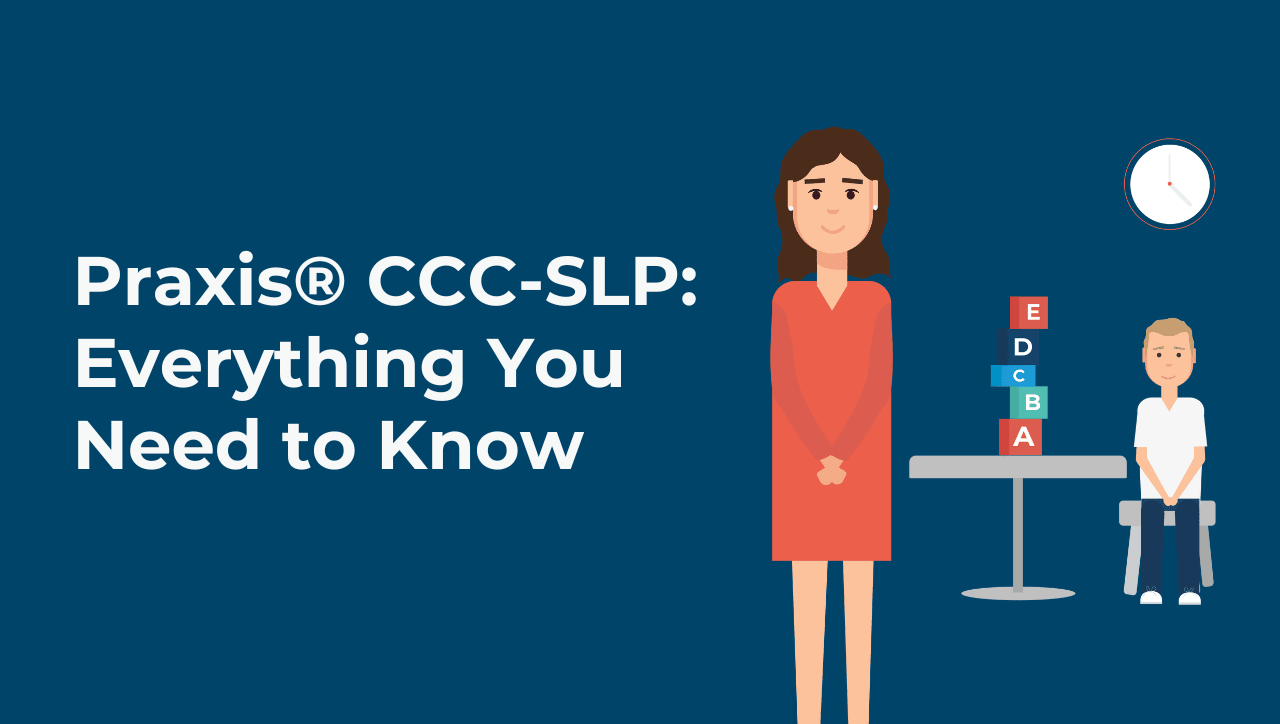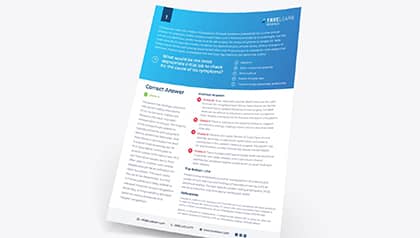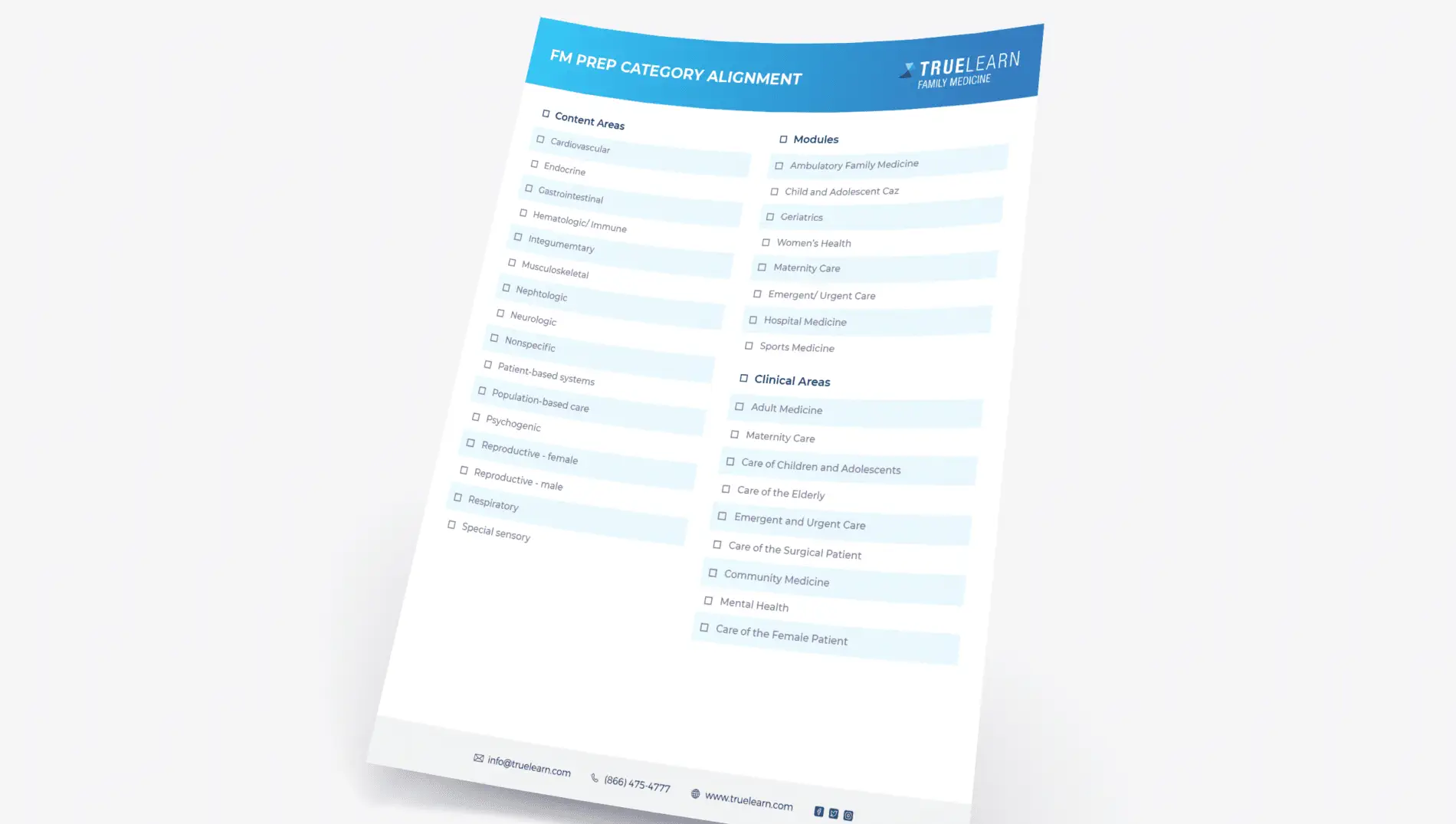How to Study for the SLP Praxis® CCC-SLP
Getting ready to take the Praxis CCC-SLP? If you’re feeling overwhelmed, you’re not alone! Studying everything you need to know to be an SLP is a lot of material. Plus, the stakes are high – you need to achieve a passing score to practice as a speech-language pathologist. With a good approach to studying, you can be fully prepared to achieve your best score on the Praxis. We’ve outline specific steps so you’ll know exactly how to study for the SLP Praxis® exam.
Get organized!
Collect your course syllabi, notes, and readings. You may need to decide whether you want to work from electronic or paper materials and convert materials that are in the wrong format. Once you have all your materials, organize them into the Big 9 areas.
Know the material you’ll be tested on.
The standards for certification as an SLP are organized around these 9 areas of practice and so is the Praxis exam! Make sure you understand each area. You’ll also need to study professional practice topics, such as ethics, research methods, documentation, and counseling.
The “Big 9” areas of SLP scope of practice are:
- Speech sound production
- Fluency and fluency disorders
- Voice and resonance
- Receptive and expressive language
- Hearing
- Swallowing/feeding
- Cognitive aspects of communication
- Social aspects of communication
- Augmentative and alternative communication modalities
Make a weekly study schedule.
Look at your weekly schedule and figure out when you’ll study. The best approach is to study consistently over time. We’d suggest 1-2 hours per day, 4 days per week, using an 8-week schedule (see #3). But the most important thing is to make a schedule that works for you, and then stick to it.
Make a schedule of study topics.
Include time to study each of the Big 9, time to take practice tests, and time for final review. Here’s a sample study schedule:
| Week | Focus |
| 1 | Organize your materials and make your weekly schedule. Review speech sound production. |
| 2 | Review fluency, hearing, and augmentative and alternative communication. |
| 3 | Review voice and resonance and cognitive aspects of communication. |
| 4 | Review receptive and expressive language. |
| 5 | Review swallowing and feeding. |
| 6 | Review social aspects of communication and professional practice topics. |
| 7 | Take a practice test and identify areas of weakness. Review these areas. |
| 8 | Final review of all areas. Take another practice test. Relax. |
Provide adequate focus to weaker areas.
Some of the topics in the Big 9 contain more content than others. That’s why we gave some areas their own week but combined two areas during other weeks. However, your own personal strengths and weaknesses should affect your schedule, too.
For example, if you just finished a great course on swallowing, you might not need as much time to study that area. If you’ve never seen a voice patient and didn’t love that class, you might need to allot more time to make sure you cover that area.
When you study, interact with your materials.
Make flashcards, draw pictures, explain a concept to a study buddy, or answer questions out loud to yourself. Active studying works better than passive studying!
Don’t forget your foundations.
It’s best to focus your studying on the “big picture” clinical questions (like assessment and treatment) in the “Big 9” areas of practice. However, you also need to study supporting details—like the etiologies of disorders and the characteristics of normal development—within each of the disorder categories. For example, make sure that you know the characteristics of normal language development when you study the receptive and expressive language area.
Review the etiologies of voice disorders when you study voice and resonance. If you feel rusty on the foundations of any of the Big 9 areas, you may need to go back to your earlier coursework and review those details.
Take practice questions.
The more familiar you are with the types of questions on the Praxis exam, the more prepared you will feel on test day. Study an area first, then take practice questions in that area to see whether you need to continue focusing on that topic. When you’ve reviewed all the topics, take a full-length practice test.
5 Common Study Mistakes
There are a few things you should look out for while you are preparing for test day.
- Not giving yourself adequate study time. You should have your study plan laid out at least 4 months prior test day. Know the tools and resources you are going to use and have your weekly study schedule planned out. Avoid cramming and the anxiety of feeling underprepared.
- Not Seeking Help When Needed: Some test-takers may struggle with certain subjects but hesitate to seek assistance. Using resources like study groups, online forums, or tutoring can provide valuable support and clarification of complex topics.
- Neglecting Self-Care: Intense study schedules can lead to burnout if not balanced with adequate rest, nutrition, and exercise. Maintaining physical and mental health is essential for peak performance on exam day.
- Insufficient Review of Wrong Answers: Simply completing practice questions and tests isn’t enough; reviewing incorrect answers to understand mistakes is critical. This review process helps solidify learning and improves future performance.
- Relying Solely on Memorization: While memorization is a component of preparation, understanding concepts and how to apply them is crucial for success on the Praxis exams. Higher-level questions require analytical skills and application of knowledge.
Take a deep breath and trust yourself. Many people struggle with test anxiety, especially for a test like the Praxis. Your studying can help build your confidence. You have learned a lot!


